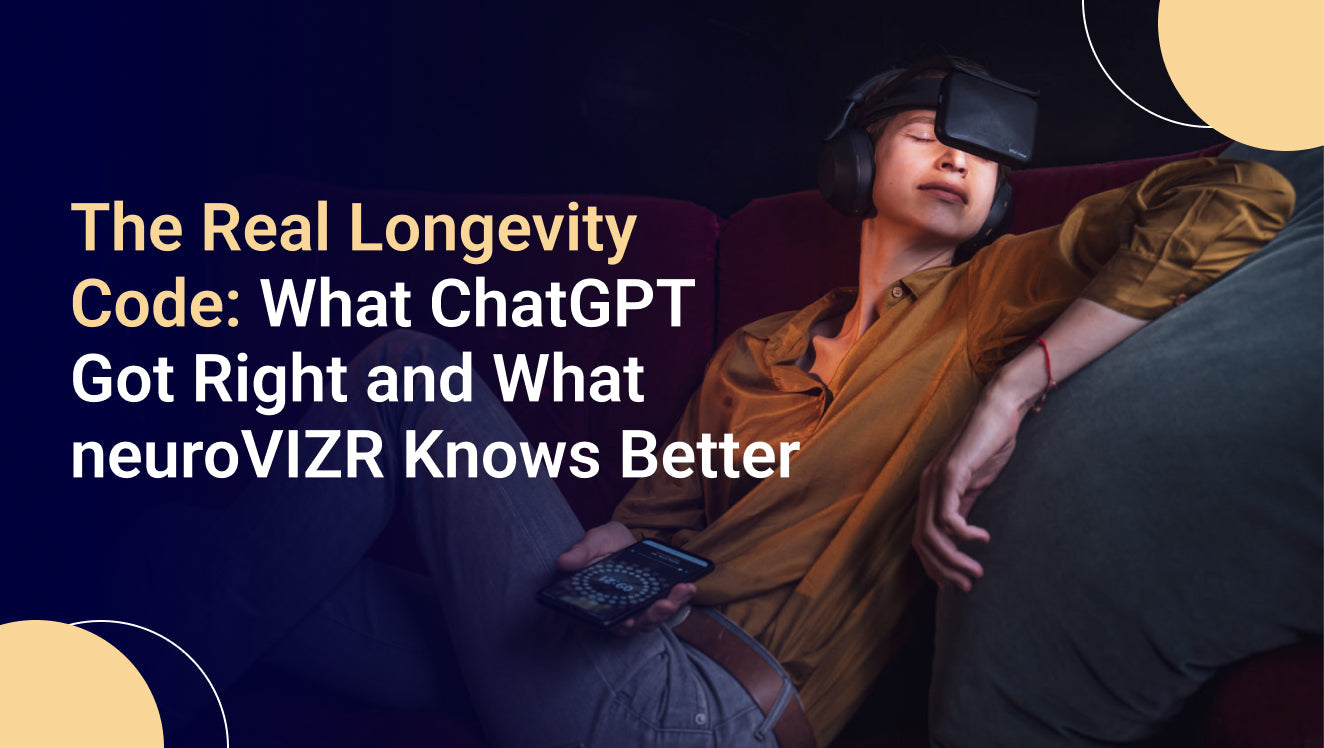When ChatGPT was asked how to live to 140, its answer was simple, logical and completely unexpected.
It wasn’t diet. It wasn’t exercise. It wasn’t even genetics.
According to its analysis of centenarians from the world’s “Blue Zones,” the real secret was low chronic stress.
Everything else was secondary.
You can eat clean, train hard, and avoid every unhealthy habit, but if your nervous system stays trapped in constant fight-or-flight, you age faster, sleep worse, and heal slower.
That insight was right. But what most systems miss and what neuroVIZR understands deeply is how the brain can actually retrain itself to stay calm.
The Science Behind Low Chronic Stress
Chronic stress isn’t just a feeling; it’s a physiological state. When your brain perceives constant threat, deadlines, pressure, comparison, or inner conflict the body releases cortisol and adrenaline continuously.
This keeps your heart rate high, digestion suppressed, and your immune system inflamed. Over time, these same stress hormones begin damaging neurons in the hippocampus (memory), amygdala (emotion), and prefrontal cortex (decision-making).
This is how chronic tension accelerates biological aging. You’re not “getting old faster” your nervous system is burning energy it was meant to restore.
You will be amazed after reading this case study - unlock your mind s hidden potential with the neurovizr
The 8 Longevity Rules - Explained by Neuroscience
1. Chronic stress isn’t about work or money.
It’s about inner conflict the gap between who you are and who you think you need to be.
This internal dissonance keeps your brain on alert. Aligning with your truth isn’t spiritual fluff it’s neurological balance.
2. Do only what doesn’t create inner resistance.
When your daily life constantly contradicts your values, your brain releases more cortisol and less serotonin. Choosing integrity isn’t selfish; it’s self-preservation.
3. Stop saving life for later.
The nervous system thrives on novelty, not deferred joy. Studies show nearly half of retirees experience health decline within five years. Live now your neurons need purpose, not pause.
4. Relationships are worth more than vitamins.
Loneliness raises mortality risk as much as heavy smoking. Social connection releases oxytocin, which lowers stress hormones and restores vagal tone your brain’s calm signal.
5. Find a purpose greater than yourself.
In Japan, it’s called Ikigai, the reason you wake up in the morning. Purpose organizes the brain’s motivational circuits and keeps you engaged, curious, and resilient.
6. Stop obsessing over “health optimization.”
Tracking every calorie or heart rate spike creates another form of anxiety. The brain confuses control with threat. Health isn’t perfection, it’s adaptability.
7. Move naturally, not out of guilt.
Movement regulates neurochemistry, but it works best when it’s joyful. Walk, stretch, dance not to compensate, but to reconnect. Rhythmic motion supports vagus nerve activity, easing stress signals throughout the body.
8. Sleep when you’re tired, eat when you’re hungry.
Your circadian rhythm is your body’s oldest intelligence. When ignored, it loses coherence. True longevity depends on honoring the body’s signals sleep, hunger, stillness, curiosity as data, not distractions.
Where neuroVIZR Begins
 Understanding that low stress extends life is one thing. But knowing how to achieve it that’s the missing piece.
Understanding that low stress extends life is one thing. But knowing how to achieve it that’s the missing piece.
In modern life, we don’t lack information. We lack rhythmic recovery. Our senses are constantly overstimulated, leaving our nervous system in a loop of alertness.
That’s where neuroVIZR steps in.
Using synchronized light and sound stimulation, neuroVIZR guides your brain into states where your body naturally relaxes, recharges, and repairs itself.
No substances. No tracking apps. Just pure neuroplasticity in action.
We don’t just talk about longevity, we help your brain experience it.
Sleep is the real longevity code
Experience the neuroVIZR effect – Sleep is the real longevity code.
Disclaimer
This content is for educational purposes only and does not replace professional medical advice. Always consult a healthcare provider for personalized guidance.
References
-
The Blue Zones – Dan Buettner, 2016
-
WHO – Stress and longevity health reports, 2019
-
McEwen, B. S. – The Brain on Stress, 2013
-
Porges, S. W. – The Polyvagal Theory, 2011
-
Harvard Health Publishing – Stress and immune health, 2022



























Share:
Stillness, Sleep & the Vagus Nerve: Why Deep Rest Is Your Superpower
Importance of Sleep in Recovery - neuroVIZR